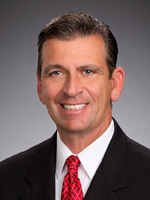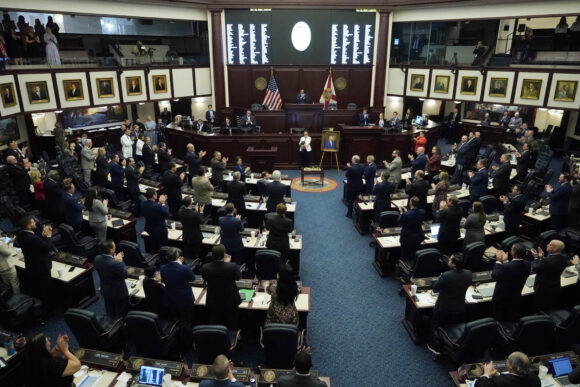Do some Florida property insurance companies hire independent adjusters to inspect property claims, then routinely alter their inspection reports to reduce estimated losses?
Yes, and it’s a widespread and fraudulent practice, according to three adjusters who spoke Tuesday at a Florida House of Representatives committee hearing.
“The insurance companies were directing file reviewers to change my estimates to repair the roofs rather than replace a totaled roof,” said Ben Mandell, a licensed all-lines adjuster. “However, the insurer was leaving my name on the estimates in a fraudulent effort to make it appear that I had written this bogus estimate.” The scheme was repeated over and over again, he said.
Another adjuster who works part-time in Louisiana also said that he has witnessed the practice numerous times in both states, with insurers redacting whole sections of his reports and leaving out thousands of dollars of needed repairs.
“The problem is, they’re leaving our name on the estimates,” adjuster Mark Vinson told the committee members. “When they send it to the policyholder, they (the policyholders) are under the impression that it’s a legitimate estimate, and it’s not.”
Adjuster Jordan Lee, who also works in Texas, said that insurance companies and adjustment firms have manipulated reports and deleted photographs and other key information in order to drastically limit payouts to policyholders.

The chairman of the House Commerce Committee, which had convened Tuesday to review House Bill 1A, an insurance crisis reform bill, said that if adjuster reports had been doctored, it could mean fraud, which should be investigated by the state attorney general. Rep. Bob Rommel then met with the adjusters in his office after the hearing. Two of the adjusters said they presented the chairman with evidence – copies of reports that they said had been altered by insurance companies.
Later Tuesday, Mandell told the Insurance Journal that several insurers have engaged in the practice in Florida and Louisiana. Vinson said that “most carriers” in Florida and several in Louisiana have altered his reports, without his permission. Vinson said that Universal Property & Casualty Insurance Co., Florida’s second-largest carrier, behind the state-created Citizens Property Insurance Corp., was one of the most frequent perpetrators.
An attorney for Fort Lauderdale-based Universal “categorically” denied that the carrier would allow such a tactic.
“That’s absolutely not the case with Universal,” said attorney Travis Miller. “The company simply has never in its history had a practice of altering, manipulating or doctoring independent adjusters’ reports for delivery to insureds.”
He suggested that the adjusters had confused Universal with United Property & Casualty Insurance, which was the defendant in a lawsuit this year that alleged similar actions by United employees. The adjusters said they were not confused and Vinson said he was not aware of the United suit.
That lawsuit was brought by SFR Services, a south Florida restoration firm, and claimed to have text messages from United desk adjusters and other company personnel that instructed field adjusters to avoid estimating wind damages altogether, to downplay damage estimates in hundreds of claims, or to add false information.
A federal judge in October dismissed the suit, noting that federal law leaves it to states to regulate the insurance business. A similar suit is now pending in state court in Martin County.
Mandell and Vinson are now working with Jacksonville plaintiffs’ attorney Steven Bush, who said he plans to file a class-action lawsuit against property insurers over the reportedly altered adjuster reports. The lawyer said 21 independent adjusters have come to him and are expected to be part of the lawsuit. Criminal charges may also result, the adjusters said.
“This is a rampant problem,” Bush said Tuesday afternoon.
He promised to provide documentation of the practices later this week. Bush also has posted YouTube videos of interviews with adjusters, speaking about the alleged actions by some insurers.
Another longtime independent Florida adjuster told the Insurance Journal that the adjusters’ allegations are no surprise to anyone in the industry.
“It’s extremely widespread,” said Mark Boardman, president of Claims Management Services Inc., based in Maitland, Florida. “Can I prove it? No. But I have had a lot of anecdotal conversations with adjusters about it.”
Independent adjusters are different from public adjusters, and are often hired by insurance companies to supplement in-house adjustment staff. Until now, many have been reluctant to speak out about the purported practices, fearing that they could lose out on insurance company business, Boardman explained.
Mandell and Vinson acknowledged that they risk losing lucrative contracts, but they said they agreed to testify because the problem has grown much worse in recent months. If the adjusters go along with the practice, they, too, could be held culpable, Mandell said.
After the Florida Legislature’s first special session on the insurance crisis, held in May, some insurers appear to be emboldened to scrub the estimates and deny claims, Mandell said.
“Claims just aren’t getting paid now, and it’s not good for consumers or legitimate insurance companies,” he said, adding that he’d rather not work for insurers who engage in the measures.
Mandell, of Haines City, Florida, has been an adjuster since 2017 but was in construction for years, and said he knows construction costs and building codes. He said he became aware of the alteration issue when he adjusted a claim in Louisiana more than a year ago. The policyholder later called him, complaining that his estimate had left out large amounts of damage from a storm. The homeowner sent him a copy of the report from the insurer, and Mandell said he was surprised to see his name on an estimate that was significantly different from the one he had submitted to the insurance company.
“I told them to hire an attorney,” Mandell said.
This year, the tactics seem to have become much more common in Florida, Mandell and Vinson told the Insurance Journal.
In one recent hurricane claim report, Vinson said he noted that the entire shingle roof of a home was heavily damaged and needed full replacement. He documented the damage with more than 100 photos. But the altered report, sent by the insurer to the homeowner, had left the roof section out of the report altogether, lowering the repair estimate by some $30,000, he said.
“And that was with photo proof, mind you,” Vinson said.
The adjusters were three of dozens of people who spoke at the House Commerce Committee hearing Tuesday. Several urged lawmakers to vote against HB 1A. The bill has been hailed by the insurance industry as it aims to end one-way attorney fees and outlaw assignment-of-benefits agreements in order to curb the huge amount of claims litigation in Florida.
Mandell and Vinson agreed that Florida’s insurance market is in trouble, but they said that insurers have themselves to blame, partly due to altered adjuster reports and low-balled payment offers.
“If they had just paid, as the estimates showed in the first place, there wouldn’t be all these other problems,” Vinson said.
“It makes things worse for everyone,” said Mandell. “The good insurance companies will be forced to adopt these same fraudulent practices in order to compete.”
Others at the hearing, and at a Senate committee meeting on Monday, testified about other alleged tactics by insurers. Several homeowners and attorneys said that some insurers have frustrated policyholders by sending as many as eight adjusters to look at a property after a claim. And carriers have required engineering reports in some claims, but have refused to provide those reports to the policyholders, speakers said at the committee meetings.
Democratic House committee members Tuesday offered 12 policyholder-protection type amendments to HB 1A. None of the amendments passed, and the bill was adopted without changes. By a vote of 27-13, the full Senate late Tuesday also approved the nearly identical Senate version of the property insurance bill, SB 2A.
The Florida Legislature’s special session on the insurance crisis is expected to conclude late Wednesday after the bills are voted on by the full House chamber.
Was this article valuable?
Here are more articles you may enjoy.


 Stellantis Weighs Using China EV Tech for Affordable Cars
Stellantis Weighs Using China EV Tech for Affordable Cars  AIG’s Zaffino: Outcomes From AI Use Went From ‘Aspirational’ to ‘Beyond Expectations’
AIG’s Zaffino: Outcomes From AI Use Went From ‘Aspirational’ to ‘Beyond Expectations’  AI Claim Assistant Now Taking Auto Damage Claims Calls at Travelers
AI Claim Assistant Now Taking Auto Damage Claims Calls at Travelers  UK Floods Raise Specter of ‘Mortgage Prisoners’ Across Banks
UK Floods Raise Specter of ‘Mortgage Prisoners’ Across Banks 